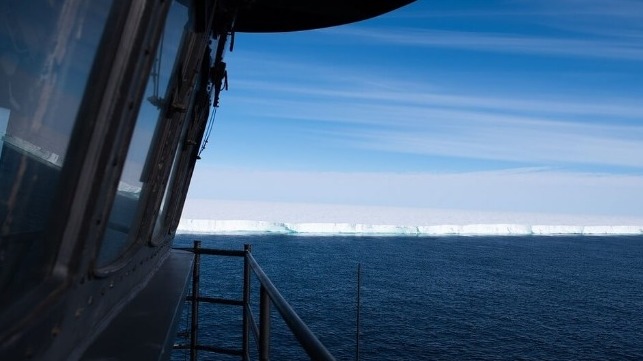Icebreaker Polar Star May Have Set a Record for Southernmost Voyage

The aging U.S. Coast Guard icebreaker Polar Star reached the southernmost navigable waters on the planet on Feb. 17 with a visit to Antarctica's Bay of Whales.
Polar Star reached a position of 78° 44.022' south latitude at about 1300 hours local time, keeping a distance of about 500 yards from the edge of the Ross Ice Shelf.
This is further south than the current Guinness World Record holder. In 2017, the residential cruise ship The World claimed to have reached 78°43.997', about 0.025 minutes to the north of Polar Star's claimed position. Crewmembers aboard the cutter are working with the staff at Guinness World Records to officially certify the icebreaker's new record.
The new record claim was made possible by the ice shelf's gradual shrinkage. While underway, Polar Star sailed in waters previously charted as part of the ice shelf that are now navigable waters. Today, portions of the edge of the Ross Ice Shelf are up to 12 nautical miles away from the positions depicted on official charts. Those charts may soon be revised: During Polar Star’s transit to and from the Bay of Whales, the vessel surveyed 396 nautical miles of the ice shelf for potential future navigational use.
In 1997, U.S. Coast Guard Cutter Polar Sea, Polar Star’s sister ship, reached 78 degrees, 29 minutes south latitude - far to the north of Polar Star's position this year.

that matters most
Get the latest maritime news delivered to your inbox daily.
In 1908, Ernest Shackleton gave the Bay of Whales its name during the Nimrod Expedition, reflecting the numerous whales he and his crew sighted. Three years later, Roald Amundsen established a base camp in the bay, and he used it as the departure point for his successful endeavor to become the first person to reach the South Pole. Years later, U.S. Navy Rear Adm. Richard E. Byrd established Little America in the Bay of Whales during his first, second, and third Antarctic Expeditions, exploring more than 60 percent of the Antarctic continent.
“The crew of Polar Star is proud to follow in the footsteps of legendary Antarctic explorers like Shackleton, Amundsen, and Byrd,” said Capt. William Woityra, the icebreaker's commanding officer. “Even today, more than a century later, we carry on that legacy of exploration, reaching new places, and expanding human understanding of our planet.”
